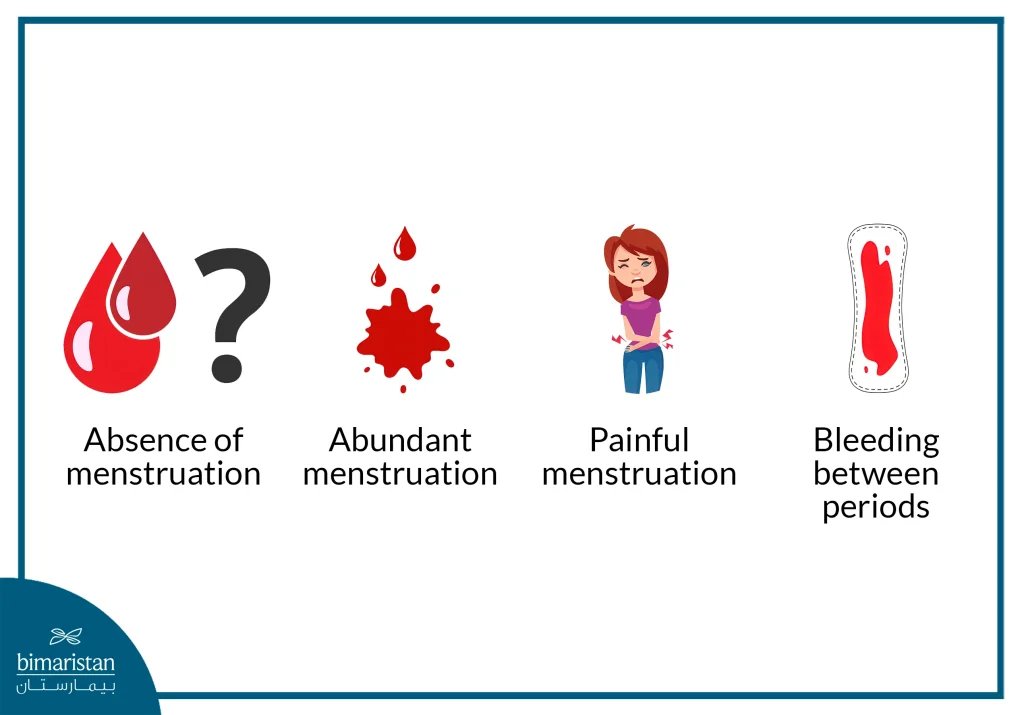Irregular periods are a common concern affecting 14% to 25% of women. The menstrual cycle is a natural part of a woman’s life, involving monthly bleeding that typically lasts 3 to 7 days. However, it can sometimes be disrupted by disorders or health issues, raising concerns and questions among patients. This highlights the importance of understanding the causes of irregular periods and the available methods for diagnosis and treatment.
What are the irregular periods?
Most women have menstrual periods that last from 3 to 7 days, usually every 28 days, but women who suffer from irregular periods experience changes in the normal pattern of menstrual cycles or periods. These irregular periods may include missing periods, having a longer or shorter cycle than usual, or having heavier or lighter bleeding than normal.
Common causes of irregular periods
There are a variety of reasons that lead to irregular menstrual cycles, including endocrine and hormonal issues, as well as some physical and psychological illnesses:
Hormonal disorders
Some thyroid disorders, such as hypo- or hyperthyroidism, indirectly affect female sex hormones such as estrogen and progesterone, leading to irregular menstrual cycles, and high milk hormone (prolactin) inhibits GnRH, which is the gonadotropic hormone.
Polycystic Ovarian Syndrome (PCOS)
In PCOS, the ovaries produce a large amount of male hormones (androgens), and these hormones cause menstrual irregularities, and sometimes the cycle may stop altogether.
Emotional stress and pressure
Certain changes in a woman’s mental health or disruption of daily routines, such as stress, can lead to changes in the concentrations of sex hormones, resulting in irregular cycles.
Severe weight changes or eating disorders
When you gain or lose a large amount of weight or exercise that leads to significant fat loss, it can result in a decrease in sex hormones, as fat plays a role in producing sex hormones, such as estrogen.
Pituitary problems
The pituitary gland controls the secretion of cycle-regulating hormones such as FSH and LH, as these two hormones regulate the activity of the ovaries, and when there is a disorder in the pituitary gland, such as hypopituitarism or pituitary tumors, this affects the menstrual cycle.
When are irregular periods a red flag?
Irregular periods may not always be dangerous, but they may be an indication of hormonal disorders or organic diseases, but there are some signs to watch out for, such as a difference in the duration of the cycle by more than 7-9 days, if it is less than 21 days or more than 35 days, or when the intensity of bleeding changes suddenly, and the absence of the cycle for more than 3 months is a serious indicator.
Do irregular periods affect fertility?
Yes, a cycle disorder often means an ovulation disorder, leading to difficulty conceiving or delayed conception and menstrual cycles without ovulation.
When should I see a doctor?
You should see a doctor if the following conditions are present:
- When irregular menstrual cycles last more than 3 months
- If the patient has had irregular menstrual cycles since the onset of puberty and has not been regular for years
- Signs of hyperandrogenism (excess hair, acne, and hair loss)
- Excessive pain or excessive bleeding.

Diagnosis of irregular periods
To diagnose menstrual irregularities, your doctor will check your medical history and symptoms for signs of irregular periods, perform a physical exam, and conduct the following tests:
- Laboratory tests (hormones – blood): FSH, LH, TSH, and prolactin.
- Ultrasound imaging: Helps detect irregular bleeding caused by uterine fibroids, polyps, or ovarian cysts.
Treatment for irregular periods
Treatment with medicines
As the first treatment option, pharmacological options include the following:
- Cycle management with hormonal pills
- Tranexamic acid
- Painkillers (paracetamol)
- Hormone regulation using appropriate medications under the supervision of a doctor
- Treating the underlying cause, such as hypothyroidism or polycystic ovary
Lifestyle changes
As mentioned earlier, stress affects sex hormones, and it is imperative to change a bad lifestyle to a healthy one by:
- Organization of sleep.
- Reduce stress.
- Eating a healthy diet
Alternative remedies
There are some alternative treatments, but they are not a substitute for a medical diagnosis; their effectiveness varies from person to person, and they can have side effects, such as:
- Nutritional supplements, such as vitamin D, magnesium, and B vitamins
- Natural herbs (with medical reservation)
Do irregular periods affect your chances of getting pregnant?
It may be more difficult to get pregnant if you have irregular periods, as you may not ovulate regularly, but it is helpful to have sex every two to three days throughout the cycle without using contraception.
The relationship between irregular ovulation and infertility
Irregular ovulation means that the egg does not release regularly or may not release, which makes it difficult to conceive. Without ovulation, an egg is not released, so fertilization or conception cannot occur.
How to boost your chances of getting pregnant despite cycle disruption
You can boost your chances of getting pregnant despite a disrupted cycle by:
- Have regular intercourse
- Lifestyle modification
- Ovulation monitoring
- Treating the cause
Medical tips to keep your period regular
The following medical tips can be followed to keep your menstrual cycle regular:
- Cycle monitoring using apps
- See a doctor if the disorder recurs
- The importance of regular hormone monitoring
In conclusion, irregular periods are common and sometimes temporary, but it is important to pay attention to changes, record symptoms, and see a doctor when necessary to ensure hormonal and reproductive health, and early understanding and appropriate intervention can help prevent complications and improve quality of life.
Sources:
- National Health Service. (n.d.). Symptoms: Irregular periods
- Attia, G. M., Alharbi, O. A., & Aljohani, R. M. (2023, November 20). The Impact of Irregular Menstruation on Health: A Review of the Literature . Cureus, 15(11), e49146.
